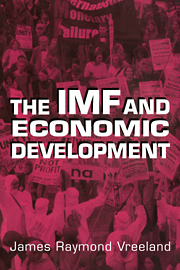Book contents
- Frontmatter
- Contents
- List of Tables and Figures
- Acknowledgements
- 1 Introduction
- 2 Analytically Significant Cases
- 3 An Analytical Approach to the Politics of IMF Agreements
- 4 Testing the Selection Story
- 5 The Effect of IMF Programs on Economic Growth
- 6 Distributional Consequences of IMF Programs
- 7 Conclusions
- Appendix 1 Variables Used in This Study
- Appendix 2 Country-Years in Samples
- References
- Index
5 - The Effect of IMF Programs on Economic Growth
Published online by Cambridge University Press: 08 January 2010
- Frontmatter
- Contents
- List of Tables and Figures
- Acknowledgements
- 1 Introduction
- 2 Analytically Significant Cases
- 3 An Analytical Approach to the Politics of IMF Agreements
- 4 Testing the Selection Story
- 5 The Effect of IMF Programs on Economic Growth
- 6 Distributional Consequences of IMF Programs
- 7 Conclusions
- Appendix 1 Variables Used in This Study
- Appendix 2 Country-Years in Samples
- References
- Index
Summary
This chapter returns to the question introduced in the first pages of Chapter 1: What is the effect of IMF programs on economic growth? The detour through the chapters on selection into IMF programs was necessary because estimating the effects of IMF programs is not straightforward. The standard difficulty in evaluating the effects of any policy or program is nonrandom selection (Heckman 1988). What one observes in the real world are not experiments which would match the “treatment” and the “control” groups, thus permitting direct inferences about the experimental effects. Previous chapters have shown that selection into IMF programs is indeed not random. The conditions of countries that participate in agreements are different from those that do not. Thus, observed differences in rates of economic growth may depend not only on the effects of IMF programs but also on selection.
Some of the factors affecting selection are observable, such as reserves and deficit; some are not. “Political will” and “trust” are examples. A methodology failing to account for these unobserved variables may overstate the value of participation by attributing the positive effects of “political will” and “trust” to the IMF program. Note that if such selection occurs, controlling only for observed variables can actually increase the bias (Achen 1986; Przeworski and Limongi 1996).
This chapter uses the methods developed by Heckman (1976, 1978, 1979, 1988, 1990) to estimate the effects of IMF programs independently of selection.
- Type
- Chapter
- Information
- The IMF and Economic Development , pp. 107 - 133Publisher: Cambridge University PressPrint publication year: 2003



